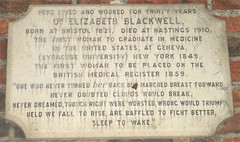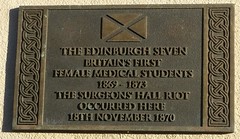Dr Elizabeth Blackwell


Dr Elizabeth Blackwell
(1821-1910)
Commemorated on 2 plaques
Here lived and worked for thirty years Dr Elizabeth Blackwell Born at Bristol 1821, died at Hastings 1910. The first woman to graduate in medicine in the United States, at Geneva (Syracuse University) New York 1849. The first woman to be placed on the British medical register 1859. "One who never turn her back but marched breast forward never doubted clouds would break. Never dreamed, though right were worsted, wrong would triumph held we fall to rise, are baffled to fight better, sleep to wake."
Rock House, Exmouth Place, Hastings, United Kingdom where they lived and worked
The Edinburgh Seven. Britain's first female medical students 1869 - 1873. The Surgeons' Hall Riot occurred here 18th November 1870.
Surgeons' Hall Museums, The Royal College of Surgeons of Edinburgh, Nicolson Street , Edinburgh, United Kingdom where they studied


